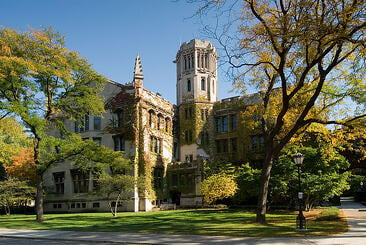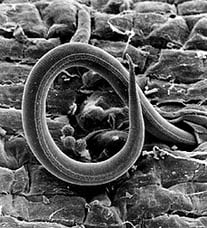
There are numerous different types of cancers that affect people around the world. According to the National Cancer Institute, national expenditures for cancer research could exceed $156 billion by 2020, making it one of the most expensive, well-funded research topics around the world. The University of Chicago is one of the many institutions committed to cancer research, with a Comprehensive Cancer Center housing more than 210 researchers and clinicians.
Read More
Tags:
Midwest,
University of Chicago,
cancer research,
BioResearch Product Faire Event,
Chicago,
IL,
UChicago,
2016,
Hospira Foundation
We’ve seen life science researchers, like Professor Wyman of UC Riverside and Professor Reguera of Michigan State University, master the production of biofuels from biomass sources, such as corn and sugarcane. However, a controversy is brewing around such practices. Critics worry that utilizing these organic materials will substantially detract from the global food supply. Here to answer those concerns is a new study from the University of Minnesota that instead uses agricultural waste as its biomass.
Read More
Tags:
University of Minnesota,
Minnesota,
BioResearch Product Faire Event,
UMinn,
Twin Cities,
2016
 One in eight couples in the United States has fertility problems. In the majority of infertility cases, the cause can be pinpointed to either the man or the woman, but sometimes there seems to be no explanation for the cause of infertility. Researchers at Rutgers University in New Brunswick, New Jersey studying infertility in roundworms have recently found a link between humans and roundworms that provides insight into human infertility.
One in eight couples in the United States has fertility problems. In the majority of infertility cases, the cause can be pinpointed to either the man or the woman, but sometimes there seems to be no explanation for the cause of infertility. Researchers at Rutgers University in New Brunswick, New Jersey studying infertility in roundworms have recently found a link between humans and roundworms that provides insight into human infertility.
Read More
Tags:
Northeast,
NJ,
New Jersey,
Rutgers University,
BioResearch Product Faire Event,
BRPF,
Rutgers,
Male infertility,
2016,
SPE-45,
Roundworms,
Izumo protein
Bioscientists are constantly discovering new methods to accelerate bone healing. First, we saw them use stem cells to regenerate ribs, and then we saw them add a protein that boosts bone regeneration. Both of these techniques involve introducing new and foreign substances into the body, which run the risk of rejection. A new study from the University of Michigan, Ann Arbor shows that, in fact, cells already at the injury site know how to repair bone if you know how to remind them.
Read More
Tags:
University of Michigan Ann Arbor,
Ann Arbor,
BioResearch Product Faire Event,
MI,
UMich,
2016
For years, we’ve been discussing reasons not to use antibiotics and have seen the development of new alternatives, such as spray-on antibodies and internal bacterial combustion. Despite this, antibiotics continue to be widely used today. Scientists at Washington University in St. Louis theorize that antibiotics are here to stay, but perhaps it is the definition of antibiotics that needs to be changed.
Read More
Tags:
Washington University St. Louis,
WashU,
BioResearch Product Faire Event,
MO,
St Louis,
2016
A few years ago, we witnessed the biotechnology industry’s first steps into bone regeneration; for instance, the University of Southern California was experimenting with stem cells to rebuild broken ribs. Now Michigan State University is learning the nuances of repairing more general bone fractures.
Read More
Tags:
Michigan State University,
BioResearch Product Faire Event,
MI,
East Lansing,
MSU,
2016
If you got behind the wheel of your vehicle to find that the fuel gauge had mysteriously disappeared, would you still drive it? University of Cincinnati researchers are studying a creative approach to fighting tumors that involves disabling cancer cells' energy resource sensors to stop them from proliferating.
Read More
Tags:
University of Cincinnati,
BioResearch Product Faire Event,
Cincinnati,
OH,
UCinci,
2016
When we talk about newly discovered drugs that fight diseases, it can appear that life science researchers pull solutions out of thin air. Indeed, very often the drug production process begins with a lengthy, tedious period of trial and error. However, a chemistry research group at the University of Illinois, Urbana-Champaign is attempting a more resourceful approach - discovering new uses for existing drugs.
Read More
Tags:
University of Illinois Urbana-Champaign,
Urbana-Champaign,
UIUrbana,
BioResearch Product Faire Event,
IL,
2016
We’ve seen bacteria eat chlorine and even consume toxic byproducts of biodiesel plants, but researchers at The Ohio State University have found a new strain that takes the cake. These extremophiles literally eat biocide designed to kill them.
Read More
Tags:
Ohio State University,
2015,
BioResearch Product Faire Event,
Columbus,
OH,
OhStu
Personalized medicine is taking on a new meaning. Bioresearchers began creating human body parts from stem cells, but now are moving on to creating human diseases. The University of Illinois, Urbana-Champaign is already growing tumors, as we saw in October. The University of Wisconsin, Madison is now following suit by growing personalized leukemia cells.
Read More
Tags:
WI,
University of Wisconsin Madison,
UWisc,
2015,
BioResearch Product Faire Event,
Madison



 One in eight couples in the United States has fertility problems. In the majority of infertility cases, the cause can be pinpointed to either the man or the woman, but sometimes there seems to be no explanation for the cause of infertility. Researchers at Rutgers University in New Brunswick, New Jersey studying infertility in roundworms have recently found a link between humans and roundworms that
One in eight couples in the United States has fertility problems. In the majority of infertility cases, the cause can be pinpointed to either the man or the woman, but sometimes there seems to be no explanation for the cause of infertility. Researchers at Rutgers University in New Brunswick, New Jersey studying infertility in roundworms have recently found a link between humans and roundworms that